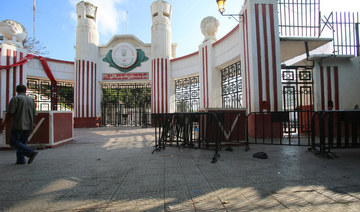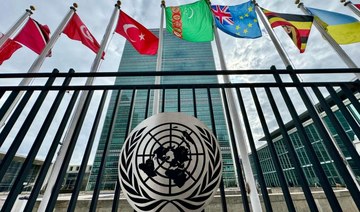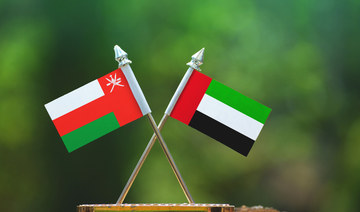ALGIERS: On the face of it, Algeria’s state-dominated economy has weathered six months of turmoil well, with flightloads of public sector workers heading abroad for holidays even as protesters who ousted the veteran president in April now target his allies.
But business, and leisure, as usual for the North African country’s army of state employees masks a growing economic drama behind the standoff between political, business, labor and military elites and those determined to force them out.
The country’s rich oil and gas resources are still flowing, but thousands of jobs are on the line and growth is stuttering in an economy where official data shows one in four of the under-30s, who form 70 percent of the population, is unemployed.
The resignation of Abdelaziz Bouteflika in April was followed by the appointment of an interim president overseen by the military, and corruption investigations have been opened into some of those around the former leader.
Putting tycoons close to Bouteflika behind bars was a key demand of the protests. But while investigations drag on, five big firms across sectors from sugar to cars are almost paralyzed as their owners struggle to sign pay checks or orders to import materials because their bank accounts have been frozen.
Malik, one of 15,000 employees of detained businessman Ali Haddad, said he had just been sacked as a reporter for Dzayer TV. “The managers told me there is no more money,” he said, withholding his second name for fear of repercussions.
Haddad denies wrongdoing and the interim government says it will find ways to safeguard jobs, but after three months without pay, hundreds of his workers have joined tens of thousands of demonstrators who gather weekly in the capital Algiers.
Elections for a successor for Bouteflika have been postponed indefinitely, despite a dialogue between opposition parties and the non-party government managed by army chief Lt. Gen. Ahmed Gaed Salah.
To limit further dissent, the interim government has held back planned reforms, initiated toward the end of Bouteflika’s 20-year rule, to wind down subsidies, open the economy to investment and create jobs outside bloated public services.
An energy law to cut red tape is on hold and inside Algeria’s sprawling state energy company Sonatrach, which is hoping to boost production by linking up with oil majors, there is growing concern.
“Output is ongoing at Sonatrach, but everything else is completely frozen including talks with Exxon and Chevron,” a Sonatrach source told Reuters, declining to be named due to the delicate political situation. Exxon declined to comment and Chevron was not immediately available.
Any deal with a foreign firm is sensitive in Algeria and needs the support of a permanent president, not a caretaker: the source said it was not clear when the talks may restart.
“No visibility for the short term as politics not economics is at the top of the agenda for now,” the source said. The company spokesman was not immediately available for comment.
The country is a key gas supplier and security partner to Europe in a volatile region: Islamist militants are on the rise in West Africa and to the east, in Libya, two rival governments are fighting for control.
The government has given no growth forecast for this year, but Algiers University economics professor Abderrahmane Aya said the turmoil will cost this year’s GDP one percentage point of growth, which reached 2.3% in 2018, and could get much worse.
“No one can now imagine the magnitude of the economic problem,” he said.
Bouteflika’s fall came as authorities began trying to persuade citizens that a welfare state providing unproductive state jobs and guaranteeing cheap housing, petrol, food, drugs and free hospital treatment was no longer viable.
Oil and gas provide 94% of export earnings and 60% of the budget, but earnings fell 6.3% to $17.65 billion in Jan-June with rising energy consumption eating into gas exports.
Imports, averaging $50 billion a year, provide most of Algeria’s needs, legacy of a reluctance to allow foreign investment due to its 1954-62 independence war with France and once strong ties with the Soviet Union.
The trade deficit rose 12% in the first half of this year, customs data showed.
“Everything seems to indicate that we are going through a long period of economic uncertainty,” Abdelhak Lamiri, a former government economic adviser, wrote in the El Watan newspaper. “The government is not empowered to take strategic decisions.”
Houari Tigharsi, an economist and member of parliament’s finance committee, said investors were apprehensive and non-energy domestic production capacity was down 50 percent.
“If the crisis drags on, we will not only see a fall in growth but the economy will even face disaster,” he said.
Interim President Abdelkader Bensalah has resisted calls to quit from protesters who see him as symbol of the old regime. He says the only way out of the crisis is to hold elections “as soon as possible.”
Algeria had vowed to develop the car industry, but reduced quotas of car spare parts imports for private vehicle assemblies after the bill rose by a fifth to $1.234 billion in the first four months of this year. Importers get money in foreign currencies from state banks.
Foreign exchange reserves fell by $7.28 billion in the first four months to $72.6 billion. In 2014, when crude prices were at $100 a barrel, they were $178 billion.
Industry Minister Djamila Tamazirt told reporters the quota reductions were “transitional measures to adjust the balance of payments” and correct incentives aimed at the automotive sector.
Four private companies assembling cars are now cutting production, despite growing demand from the country’s 43 million people which may drive up prices of second-hand cars.
Family-owned firm Sovac, which runs an assembly plant with Germany’s Volkswagen, has suspended orders for this year. Sovac head Mourad Eulmi is being investigated for graft, which he denies.
Around 800 workers assembling vehicles under the Hyundai brand were given forced leave by their employer Tahkout Manufacturing in July due to lack of raw materials, according to state media.
While sectors like food, home appliances and mobile phones have been opened up to private companies, the non-energy sector grew by just 4% last year, up from 2.2% the year before.
Bureaucracy abounds and dominant state banks have little experience of commercial lending.
“We will need bank financing to expand our investment,” said Ziad Loucif, communication manager at Cuisinox, a private firm focused on kitchen equipment manufacturing, mainly for hotels. “We want the state to facilitate investment.”
Work on a 185-km (115-mile) railway line has stopped and some 200 employees were put on forced leave for a “lack of liquidity.” The project belonged to detained Bouteflika ally Haddad.
“The government is working to find legal solutions for these companies,” Finance Minister Mohamed Loukal told state news agency APS. “I can assure you that production tools and jobs at these companies will be safeguarded.”
Algerian economy creaks at the seams after six months of turmoil
Algerian economy creaks at the seams after six months of turmoil

- Thousands of jobs threatened as business tycoons detained
- Talks between state energy firm and oil majors frozen
Closing Bell: TASI edges down to close at 12,254 points
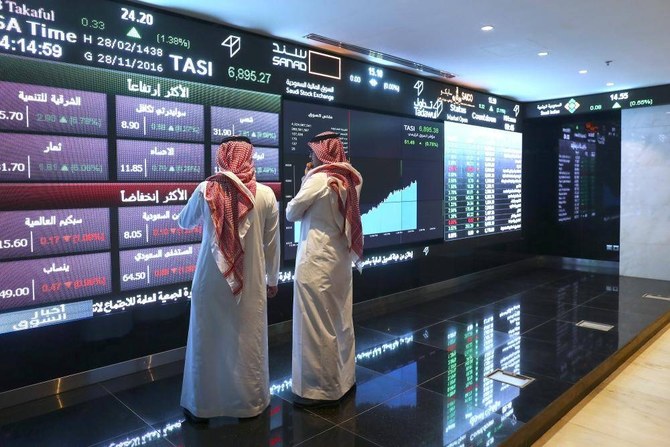
RIYADH: Saudi Arabia’s Tadawul All Share Index dipped on Thursday, losing 101.16 points, or 0.82 percent, to close at 12,254.53.
The total trading turnover of the benchmark index was SR6.9 billion ($1.84 billion) as 75 stocks advanced while 144 retreated.
Similarly, the MSCI Tadawul Index decreased by 8.99 points, or 0.58 percent, to close at 1,539.63.
The Kingdom’s parallel market, Nomu, increased, gaining 362.13 points, or 1.38 percent, to close at 26,688.25. This comes as 34 stocks advanced while as many as 27 retreated.
The best-performing stock of the day was Fawaz Abdulaziz Alhokair Co. The company’s share price surged by 6.39 percent to SR11.32.
Other top performers include Etihad Atheeb Telecommunication Co. and Saudi Cable Co., whose share prices soared by 5.57 percent and 5.35 percent, to stand at SR125and SR74.8 respectively. National Metal Manufacturing and Casting Co. and Saudi Steel Pipe Co. also fared well.
The worst performer was Al Sagr Cooperative Insurance Co., whose share price dropped by 7.11 percent to SR33.30.
ACWA Power as well as Bawan Co., did not perform well as their share prices dropped by 6.87 percent and 5.78 percent to stand at SR420 and SR44, respectively.
On the announcements front, a general assembly of Bank AlJazira approved increasing the capital by SR2.05 billion, representing a 25 percent increase.
This growth will be achieved through the capitalization of a portion of the statutory reserves, granting one share for every four shares to strengthen the bank’s capital base and enable it to achieve its strategic objectives, according to Al-Ekhbariya.
Additionally, authorization was granted to the board of directors to distribute interim dividends on a semi-annual/quarterly basis for the fiscal year 2024. Approval was also given to the compensation and benefits policy for senior executives at Bank AlJazira.
Moreover, the profits of Banque Saudi Fransi rose to SR1.15 billion during the first quarter of 2024, a 7 percent increase compared to the same period in 2023, which stood at SR1.07 billion.
The bank attributed this growth to a rise in commission income by 27.5 percent, primarily due to higher returns on financing and investments. However, there was a slight decrease in net commission income by 0.3 percent due to an increase in specific commission expenses.
Additionally, total operating expenses decreased 6.2 percent, mainly due to a reduction in the provision for expected credit losses on loans and advances. This was partially offset by an increase in the provision for other financial assets and rising staff salaries and expenses.
On another note, the stock of Al-Rajhi Co. for Cooperative Insurance SJSC, Al Rajhi Takaful, which is counted for in the insurance sector on the main market, recorded its highest price since listing on April 25, at SR142.
Furthermore, Saudi Exchange approved the listing request for government debt instruments issued by Saudi Arabia, totaling SR5.1 billion.
These instruments comprise issuance number 2024-04-07, valued at SR1.6 billion, and 2024-04-12, valued at SR3.5 billion. Trading of these instruments will commence on April 29.
Additionally, Rawabi Holding Co., also referred to as Rawabi, has successfully concluded its largest Saudi Riyal-denominated sukuk issuance, totaling SR1.2 billion. Driven by high market demand, this milestone surpasses Rawabi’s previous issuance record of SR875 million in 2023.
Since the launch of its sukuk program in 2020, Rawabi Holding has issued approximately SR6.5 billion across 18 tranches and redeemed seven tranches totaling around SR2.9 billion.
Rapid expansion of batteries crucial to meet COP28 climate goals: IEA
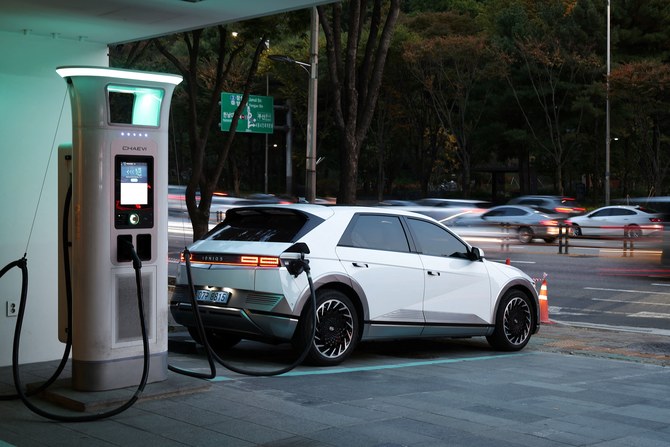
RIYADH: Global battery production must be scaled up to meet the climate security goals set at COP28, according to the International Energy Agency.
In its latest report, IEA said battery technology witnessed unprecedented growth in 2023, outstripping almost all other clean power source solutions.
The think tank added that an expected sharp fall in battery costs will accelerate the shift to renewable energy from fossil fuels in the coming years.
“Growth in batteries outpaced almost all other clean energy technologies in 2023 as falling costs, advancing innovation and supportive industrial policies helped drive up demand for a technology that will be critical to delivering the climate and energy targets outlined at the COP28 climate conference in Dubai,” said IEA in the report.
It added: “After their deployment in the power sector more than doubled last year, batteries need to lead a sixfold increase in global energy storage to enable the world to meet 2030 targets.”
During the COP28 summit, nearly 200 countries agreed to triple renewable energy capacity by 2030, double the pace of power source efficiency improvements, and transition away from fossil fuels.
The report added that 1,500 gigawatts of battery storage would be required to triple renewable capacity globally by the end of this decade.
However, IEA warned that a shortfall in deploying enough batteries could stall clean energy transitions in the power sector.
Battery manufacturing
According to IEA, battery manufacturing has more than tripled in the last three years, with China accounting for 83 percent of current production capacity, up from 75 percent in 2020.
The report added that 40 percent of announced plans for new battery manufacturing are in advanced economies such as the US and EU.
“If all those projects are built, those economies would have nearly enough manufacturing to meet their own needs to 2030 on the path to net zero emission,” said IEA.
In the earlier days, the most common type of batteries, those based on lithium-ion, were typically associated with consumer electronics. However, today, the energy sector accounts for over 90 percent of overall battery demand, said the report.
The intergovernmental organization added that battery deployment in the power sector increased by more than 130 percent in 2023 compared to the previous year, adding a total of 42 GW.
Moreover, batteries have enabled electric car sales to surge from 3 million in 2020 to almost 14 million last year in the transport sector.
Earlier in April, another report by IEA revealed that global sales of electric cars grew by approximately 25 percent in the first quarter of this year compared to the same period in 2023.
“The electricity and transport sectors are two key pillars for bringing down emissions quickly enough to meet the targets agreed at COP28 and keep open the possibility of limiting global warming to 1.5 degrees Celsius, ” said Fatih Birol, IEA’s executive director.
He added: “Batteries will provide the foundations in both areas, playing an invaluable role in scaling up renewables and electrifying transport while delivering secure and sustainable energy for businesses and households.”
Falling costs
According to IEA, battery costs have fallen by over 90 percent in less than 15 years, one of the fastest declines ever seen in clean energy technologies.
However, the agency highlighted that costs must come down further without compromising quality and technology.
“The combination of solar PV (photovoltaic) and batteries is today competitive with new coal plants in India. And just in the next few years, it will be cheaper than new coal in China and gas-fired power in the US. Batteries are changing the game before our eyes,” said Birol.
According to IEA, ensuring energy security also requires greater diversity in supply chains, including extracting and processing the critical minerals used in batteries.
Birol noted that governments worldwide have an important role in building resilient local and international supply chains to ensure that securely and sustainably produced batteries come to market at a reasonable cost.
“Legislation such as the Inflation Reduction Act in the US, the Net-Zero Industry Act in the EU, and the Production Linked Incentive in India are good examples of how policy can affect real change in the industry by backing technology manufacturing,” said Birol.
He also underscored the necessity to implement supportive policies to help speed up deployment by minimizing barriers to market entry for developers and reducing red tape that can stifle new projects.
Key to energy transition
In its report, IEA also highlighted the versatility of battery storage to ensure clean energy transition.
“In the power sector, batteries help smooth out the variability of renewable electricity from technologies such as wind and solar,” said the agency.
IEA added that battery storage can alleviate grid congestion in times of high supply, offering an outlet to capture and store excess renewable electricity that would otherwise be lost.
“Reducing emissions and getting on track to meet international energy and climate targets will hinge on whether the world can scale up batteries fast enough. More than half the job that we need to do will rely, at least in some part, on battery deployment,” added Birol.
Moreover, batteries can also provide critical service in the case of emergencies caused by extreme weather or other disruptions.
The deployment of batteries will also provide the grid with highly technical services, such as voltage and frequency control, that can help system operators and provide access to people who lack electricity.
“In a pathway to achieving universal energy access worldwide by 2030, they help 400 million people in emerging and developing economies gain electricity access through decentralized solutions like solar home systems and mini-grids with batteries,” IEA concluded.
More than two-thirds of UAE retail investors hold stocks in AI companies: eToro survey

RIYADH: More than 70 percent of retail investors in the UAE have stocks of companies developing artificial intelligence, according to a survey by trading platform eToro.
The 71 percent mark underscores a widespread understanding of AI’s potential as a catalyst for innovation and a source of competitive edge.
UAE retail investors’ interest in AI goes beyond holding stocks. When asked about their use or plans to use AI tools like ChatGPT to guide investment decisions, 39 percent reported that they already employ these technologies.
Global Markets Strategist at eToro, Ben Laidler, said: “Microsoft’s recent $1.5 billion investment in Abu Dhabi’s G42 is a big endorsement of the UAE’s potential as a global AI hub, which is reflected in the survey results showing widespread AI adoption by local investors and consumers.”
Millennials lead the charge when it comes to generational users, with 40 percent of those aged 25-44 using AI tools.
Baby Boomers and Gen X investors follow closely, with 39 percent and 38 percent, respectively.
Underlining the critical role that artificial intelligence might play in future investment strategies, an additional 52 percent of respondents, beyond those already using AI tools, said they are willing to adopt the technology to guide or adjust their portfolios in the future.
This trend defies generational stereotypes, with the older cohorts of investors directing the charge.
Baby Boomers lead in interest in integrating AI into investment planning, with 60 percent showing enthusiasm, followed by Gen X at 58 percent.
Laidler said: “AI stocks were the performance juggernauts of 2023, leading the tech sector revival and propelling the S&P 500 into bull market territory. AI trends helped make NVIDIA and Meta the best S&P 500 stock performers of last year, with their share prices tripling.”
He added: “Whilst we’re unlikely to see a repeat performance in 2024, the benefits of AI’s rapid adoption are broadening across the stock market and economy as it rapidly moves from hype to reality.”
Furthermore, eToro analyzed which companies experienced the highest proportional increase in UAE-based investors on its platform from quarter to quarter, revealing that AI stocks were the most popular theme during the first three months of the year.
Omani officials forge economic alliances with Saudi Arabia, Japan, and US
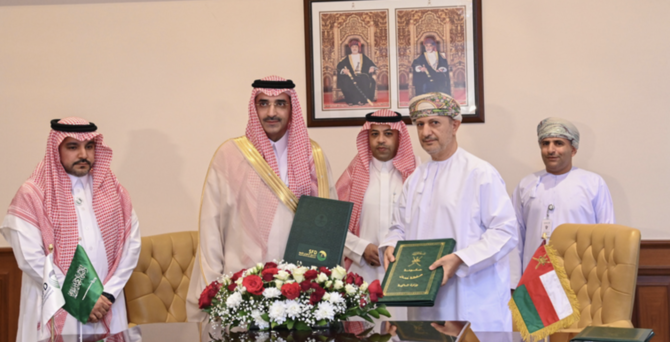
RIYADH: Oman’s industrial infrastructure is set to receive a boost following a new agreement with Saudi Arabia, fostering private sector participation in the country’s economic growth.
A memorandum of understanding, aimed at financing the infrastructure of several industrial zones in Oman, was signed during a meeting between Minister of Finance Sultan bin Salem Al-Habsi and Sultan Abdulrahman Al-Marshad, CEO of the Saudi Fund for Development, the Oman News Agency reported.
Discussions centered on cooperation mechanisms between Oman and the fund, along with updates on collaborative development projects.
The aim is to develop the industrial and logistical sectors by providing all necessary basic services, thereby encouraging the private sector to contribute to Oman’s economic development in line with Oman Vision 2040, as reported by the agency.
This memorandum falls within the framework of cooperation between the two parties to support developmental areas in Oman. These encompass infrastructure, higher and vocational education programs, and water, along with the industry and mining sectors. Additionally, it includes transportation and communications sectors, as well as developmental projects in the energy sector.
On another note, Ali bin Masoud Al-Sunaidi, chairman of the Public Authority for Special Economic Zones and Free Zones, met with Ken Saito, minister of economy, trade and industry of Japan, and his accompanying delegation in Tokyo.
During the meeting, they reviewed the business cooperation between the two countries and the major projects under construction in the economic and free zones and industrial cities in Oman, notably the low-carbon iron production project in the Special Economic Zone in Duqm.
The visit also included meetings with officials from companies engaged in iron and its derivatives production, and renewable energy equipment manufacturing companies, as well as a visit to Yokohama Port to learn about its experience in receiving ships specialized in energy and petroleum product transportation.
Also on April 24, Oman and the US explored ways to enhance trade, investment, and address challenges comprehensively during the second strategic dialogue held in Washington.
The Omani side was chaired by Sheikh Khalifa bin Ali bin Issa al-Harthy, undersecretary for Diplomatic Affairs, Ministry of Foreign Affairs, while the US side was chaired by Jose Fernandez, undersecretary of state for Economic Growth, Energy, and the Environment.
Both sides discussed opportunities for American companies in Oman, focusing on ICT, semiconductors, and clean energy services, expressing commitment to enhancing cooperation in clean energy solutions and mineral investments.
They addressed environmental priorities under the Omani-American cooperation memorandum, fostering communication between researchers from both countries for clean energy research.
Saudi NHC, Spain’s Urbas to construct almost 600 housing units in Al-Fursan suburb
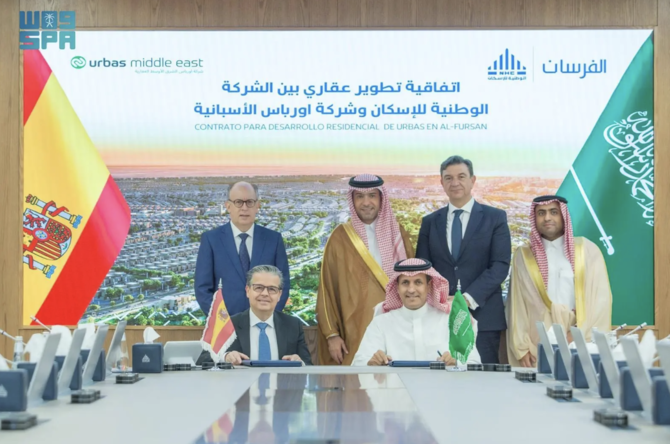
RIYADH: Saudi Arabia’s Al-Fursan suburb will soon be home to 589 new residential units worth around SR1 billion ($266 million) thanks to a deal sealed by the National Housing Co.
Inked with Urbas Middle East Real Estate Co., a subsidiary of the Spanish Urbas Group, the agreement involves the development as well as construction of the housing units on an area spanning 150,000 sq. m, the Saudi Press Agency reported.
This collaboration marks a significant milestone in the development of the Al-Fursan suburb. It also promises to set new standards in property development.
“This agreement complements the efforts of the recent visit to Spain and continues to attract international investments with major companies to provide various housing products that fulfill and meet the desires of citizens,” Saudi Minister of Municipal and Rural Affairs and Housing Majid Al-Hogail said in a post on X.
“As an extension of our journey in attracting the best international experiences and expertise in the real estate development industry, I was pleased to meet the CEO of the Spanish company Urbas, which is planned to be one of the companies developing the Al-Fursan neighborhood project in Riyadh,” Al-Hogail added.
The minister also highlighted how this step will contribute to providing innovative housing options and facilitate the exchange of experiences between Saudi and international developers.
Moreover, NHC has also revealed the sale of 1,300 residential units within Al-Fursan in the first quarter of 2024, generating a total value exceeding SR1.5 billion.
This accomplishment emphasizes the firm’s keenness in creating vibrant, quality living spaces that meet and exceed the expectations of modern residents.
Al-Fursan, known as one of the largest urban development projects in the region, is designed to align with the Kingdom’s Vision 2030.
The suburb covers an area of 35 million sq. m. and is set to feature over 50,000 housing units, accommodating more than 250,000 residents.
It is equipped with over 190 crucial facilities, including educational, healthcare, and recreational services, all surrounded by more than 6 million sq. m. of green spaces. This widespread greenery is part of a broader initiative to further elevate the living environment and contribute to the Saudi Green Initiative by planting over half a million trees.
Urbas Group has experience in over 20 countries with 30,000 residential units. Urbas Middle East plans to grow in Saudi Arabia, showing its commitment to global expansion.



